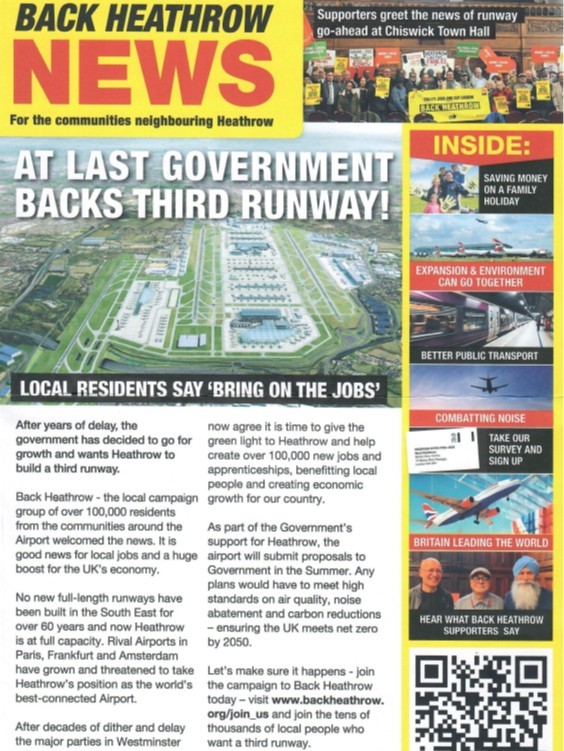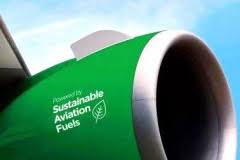BACK HEATHROW
If you’ve received a glossy leaflet from ‘community group’ Back Heathrow, you may be interested in more context.

This industry-funded lobby group was set up in 2013 by Rob Gray, previously an executive director at Aviation Foundation and Nathan Fletcher, a PR officer at the airport. In June 2014, it recorded having assets of just over £228K and miraculously this had increased to just over £955K in 2016 – a sum that most community groups could only dream of! Their lack of transparency about their funding and the wild claims in their brochures that “114,000 jobs are at risk if Heathrow shuts down” resulted in criticism in the press. AirportWatch | Extent to which “Back Heathrow” is funded by Heathrow, and is not a true community campaign, revealed
Rob Gray left in 2017 to become Director of Community and Stakeholder Engagement for Heathrow airport and there are now two directors, one of whom is former MP Parmjit Dhanda who sits on the National Policy Forum chaired by Rachel Reeves. Ami McCarthy of Greenpeace voiced concern to Sky News in Jan this year that the chancellor was “getting her facts about airport expansion from the Heathrow lobbyists in her own party”.
Economic benefit
The Airports Commission said the economic benefit would be up to £62 billion over 60 years but in 2018 Government downgraded the net national benefit of expansion to -£2.5bn to £2.9bn spread over 60 years. TFL estimated that the surface access costs could be £15bn yet Heathrow only offered to pay £1.1bn. Government has said it needs to be privately funded so who is going to pick up the bill? Heathrow expansion – surface access costs
Dr Alex Chapman, senior researcher at the New Economics Foundation summed it up:
“For years, this government has let the air travel industry balloon in size, based on dangerously outdated claims that it is boosting the UK’s economy. The reality is declining business air travel, declining wages for air travel workers, declining job numbers, and declining domestic tourism spending in the UK. And that’s before you consider the rise in noise, air pollution and dangerous emissions driven by UK airports. So who exactly is benefitting from ever more air travel? You needn’t look much further than the highly paid executives, the private shareholders, and the wealthy minority of ultra-frequent flyers.”
According to the Office for National Statistics, overseas residents spent £31.1bn on visits to the UK in 2023 while UK residents spent £72.4bn on visits abroad. Although not all these passengers departed from Heathrow, many would have done. The very last thing we need is more people spending their cash on foreign holidays instead of supporting UK tourism.
NOISE
‘The AEF estimates a third runway could put 300,000 more people under a new flight path. Heathrow’s own assessment says over 500,000 people would be newly affected by aircraft noise from the expansion alone, while the government estimates two million people could experience significant noise increases.’ Chartered Institute of Environmental Health
Third runway at Heathrow could add extra 4.4m tonnes of CO2 a year
Residents living under noisy flightpaths can suffer spikes in blood pressure even when asleep, and a 10 – 20% increased risk of strokes and heart disease Aircraft noise – Aviation Environment Federation
‘The noise impacts of airport expansion should be treated as a public health hazard and given greater weight in assessments of the effects of airport expansion.’ Environmental-Audit-Committee-call-for-evidence-airport-expansion-and-climate-and-nature-targets.pdf
Although new aircraft technology may reduce noise, long-haul trips result in heavier, noisier take-offs and climbs. Global warming is contributing to higher temperatures which require an increased engine speed for the same thrust, resulting in more noise. The other factor for overflown communities is the way planes are flown, and which noise abatement departure profile is used.
AIR POLLUTION
Millions of Londoners are exposed to ultrafine particles from planes which can penetrate deep into the lungs and bloodstream. Plane pollution poses serious health risks to… | T&E United Kingdom
JOBS
The estimations seem to vary wildly – from 77,000 up to 100,000 AirportWatch | New DfT report indicates number of local jobs from Heathrow 3rd runway about 37,700 by 2030 – not “up to 77,000”
Some have rejoiced at the estimate of so many new jobs yet 800 staff currently employed by a contractor to help passengers at the airport had to threaten industrial action over low pay. Unite general secretary Sharon Graham commented in June this year: ‘Heathrow airport is behaving disgracefully – its attempts at union busting will fail miserably.’
SUSTAINABLE AVIATION FUEL (SAF)
Whilst SAF will reduce carbon emissions by not using fossil fuels in production, CO2 is still emitted when SAF is burnt in a jet engine. Government is projected to meet only 17% of UK aviation fuel demand in 2040, rather than the mandated 22%. Is there a hole in the UK’s sustainable aviation fuel supply? – Aviation Environment Federation
SAF is burnt in a jet engine. Government is projected to meet only 17% of UK aviation fuel demand in 2040, rather than the mandated 22%. Is there a hole in the UK’s sustainable aviation fuel supply? – Aviation Environment Federation
‘If the UK has any hope of meeting its climate targets, it should instead be seeking alternatives to flying where possible.’ Ben Purvis University of Sheffield There isn’t enough ‘sustainable’ aviation fuel to make a dent in our emissions – and there won’t be for years
CARBON EMISSIONS
Emissions will exceed 64 million tonnes of CO2 in just five years if expansions are approved at London airports. Heathrow expansion would account for around three quarters of the forecasted emissions. The Committee for Climate Change in its 2023 report said: ‘There has been continued airport expansion in recent years, counter to our assessment that there should be no net airport expansion across the UK.’
Aviation at 38.4 MtCO2e (million tonnes of carbon dioxide equivalent) was 9.3% of the UK’s total emissions of 413.7 MtCO2e in 2024 which means that aviation emissions now contribute a greater share of the UK emissions total than the UK electricity supply sector! Progress in reducing emissions – 2025 report to Parliament – Climate Change Committee

Be First to Comment